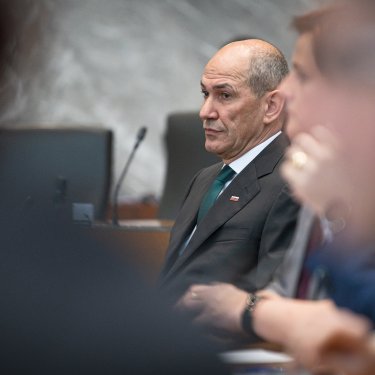Slovenia: Trump’s disciple attacks journalists and introduces a systemic change

Inspired by the U.S. President and backed by Hungarian oligarchs’ media investments, the Slovenian government wages hate campaigns against critical journalists, while attempting to tighten the control over the public television. Given the threats, Reporters Without Borders (RSF) asks for guarantees of the safety of journalists and of independence of the public broadcaster.
“Worn-out prostitutes for 30 or 35 euros”, “liars” and “fake news” are the insults that Prime Minister Janez Janša has addressed to both Slovenian and foreign journalists criticising his action, openly embracing Donald Trump’s communication strategy.
Returning to the position of Prime Minister in mid-March for the third time in a long career, Slovenia’s most powerful politician has launched a systemic change in the country’s media landscape, as currently shown by the attempt to take the control of the public broadcaster. With his far-right SDS party, he has orchestrated smear campaigns against his enemies, using the pro-government media funded by oligarchs faithful to his European mentor, the Hungarian Prime Minister Viktor Orbán.
When RSF and six other press freedom organisations decided to share their concern in writing in April with European Commission Vice-President for Values and Transparency Věra Jourová, a pro-government media outlet attributed their initiative to a “side-effect of cocaine”. In her reply to the NGOs, Jourová nonetheless said politicians should respond to criticism “with facts, not attacks” and warned against “violence online which can translate into violence offline.”
But Janša has every leeway to attack journalists now that he knows he is under the protection of the Slovenian courts. In a decision taken in February and announced on 6 May, Slovenia’s Supreme Court overturned a lower court ruling which had condemned him for defamation of journalists. Back in 2016, as an opposition politician, he labeled two journalists of the public broadcaster, Radiotelevizija Slovenija (RTV), Eugenija Carl and Mojca Šetinc Pašek, as “worn-out prostitutes for 30 or 35 euros”.
The Supreme Court ruled that the tweet came under the category of “highly protected political expression” and that freedom of expression prevailed over protection against defamation.
Šetinc Pašek, the journalist who brought the defamation suit, has also been ordered to pay Janša’s legal fees. By taking this decision, the Supreme Court has set a dangerous precedent and sent a chilling message to all Slovenian media that are critical of the government.
The decision is a windfall for Janša who clearly sees attacks on journalists as part of his political strategy. In a declaration published on the government website on 11 May, he attributed Trump’s 2016 election victory “above all to his rapid, understandable reactions on Twitter which prevented more serious manipulation by hostile media.” Although Janša denied wanting to wage a “war against the media,” he attacked RTV, likening it to the Communist Party of the former Yugoslavia.
He has singled out RTV ever since his return to the Prime Minister’s Office, accusing it of “spreading lies” and of being “overpaid,” thereby threatening the continuation of its state funding. His anger has been fuelled by the fact that journalists questioned a proposed salary hike for government ministers. In the days following discussion of this proposal, a pro-government weekly branded several of the journalists as “terrorists” and an official government letter accused RTV of having been “directly run by the former communist structures”.
Following the insults, RTV crews were threatened in the street and their vehicles damaged at least on two occasions, most recently on 25 May.
Not just verbal attacks
The government replaced three of the RTV Oversight Board’s members on 16 April although their terms had not expired. An attempt to replace two other members of the Board, which is supposed to guarantee the broadcaster’s independence, was blocked on 20 April by a parliamentary committee, which said it was illegal because the government is empowered to name only four of its members. The ruling party has also reshuffled the RTV Programme Council, which oversees its editorial line and chooses its director-general.
At the same time, the Prime Minister has used the coronavirus pandemic to settle scores with Blaž Zgaga, an investigative reporter and RSF’s correspondent in Slovenia, who has in the past investigated alleged corruption cases involving Janša.
Ever since Zgaga filed a freedom of information request with the Covid-19 crisis unit in mid-March, he has been harassed on social media and by the Demokracija weekly and Nova24 TV – media controlled by the SDS and funded by Hungarian oligarchs close to Prime Minister Viktor Orbán. The long and violent hate campaign against Zgaga, to which Janša has contributed by accusing him of being a “liar”, has led to online death threats against the journalist.
Rafael Buschmann, a Der Spiegel reporter who defended Zgaga, was the target of a similar smear campaign triggered by Janša’s sarcastic tweet – “We know you”. Nemanja Rujević, a member of the Serbian bureau of Deutsche Welle, which awarded a prize to Zgaga, was attacked on social media. The letter about Zgaga that RSF and six international partners sent to the Slovenian interior minister was described by Janša as “fake news”.
“It’s time for Janez Janša to stop behaving like the Trump of Central Europe and start embodying European values, especially as Slovenia prepares to take over the rotating Presidency of the Council of the European Union in 2021,” said Pavol Szalai, the head of RSF’s EU-Balkans Desk. “Instead of stoking hatred and trying to control the public media, the government should guarantee journalists’ physical safety and RTV’s independence.”
Slovenia is ranked 32nd out of 180 countries and territories in RSF's 2020 World Press Freedom Index.



